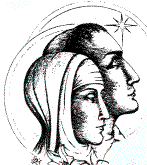
Rooted in Truth and Justice
In the 13th century, St. Dominic by his example defied the common practice of his rich peers in the Church and lived among the poor to share the Word of God and work for justice.
St. Catherine of Siena, now recognized as a "Doctor of the Church," worked as a negotiator to mend differences in the Church. She was a mystic whose constant conversation with God permeated her relationships and her ministry.
Both St. Dominic and St. Catherine were risk-takers in their time. So, too, was Mother Maria Benedicta Bauer, who founded the Racine Dominicans in 1862. As prioress of the cloistered Bavarian community, she was the first to send women to the United States to minister. Mother Benedicta herself then came specifically to found a community committed to teaching immigrant children. That same risk-taking spirit continues through the Racine Dominicans' commitment to truth and justice in a contemporary world.
A brief history of the Racine Dominicans
The Congregation of the Sisters of St. Dominic, now more commonly called the Racine Dominicans, was founded in Racine, Wisconsin, by Mother Benedicta Bauer and Mother Thomasina Ginker in 1862. The two nuns traveled from the monastery of Heilig Kreuz in Regensburg, Bavaria, in 1858, intent on establishing a motherhouse and school to teach children of German immigrants. After four years, the Regensburg Sisters gathered ten companions, purchased property in Racine, Wisconsin and began the foundation of our community serving the underprivileged and providing education in English and German to mostly working class immigrant students.
For more than 150 years, the Racine Dominicans have continued to build on this foundation begun by Mother Benedicta and Mother Thomasina in serving people in need through education. During the Racine Dominicans congregational peak, they served in over fifty institutions of learning. In addition to traditional roles in the field of education, the Racine Dominicans currently serve as health care professionals, social workers, prison ministers, community organizers, environmentalists, counselors, administrators, cooks, pastoral ministers, artists, spiritual directors, musicians, peace activists, researchers, college professors, writers and more. They are living in eight states in pursuit of truth and justice throughout the world.

